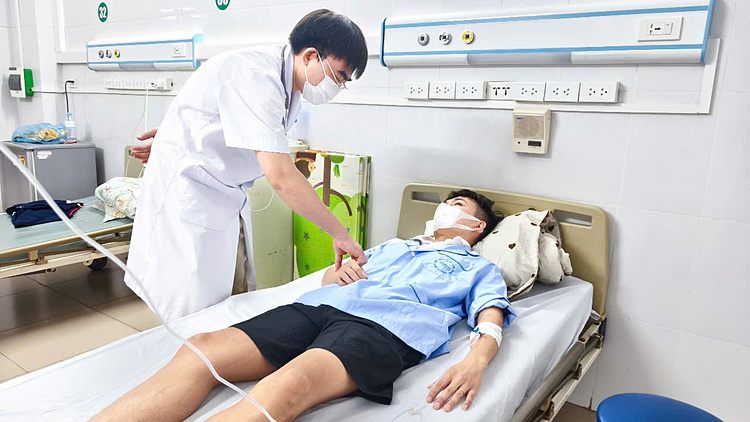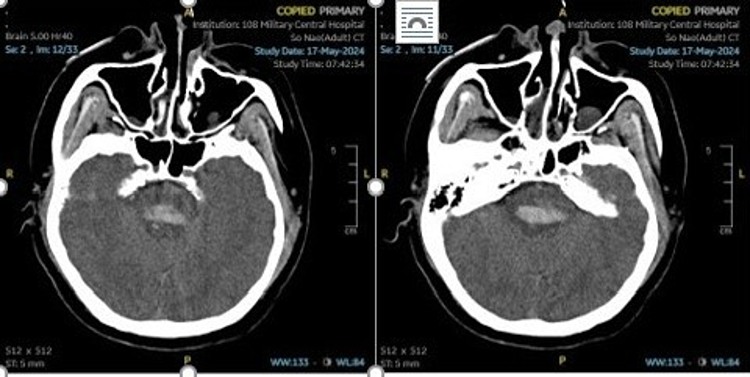Tuan, a software engineer, works from morning till night, practically "living" on his computer. He gets little exercise, sleeps infrequently, has irregular meals, and drinks 2-3 cups of coffee daily to fight off sleepiness.
Until this incident, Tuan was healthy, with no history of kidney disease, diabetes, or other illnesses, including high blood pressure. He used to think, "High blood pressure is an old person's problem. What do I have to worry about at my age?", until he collapsed at his desk. His colleagues rushed him to the hospital, where doctors diagnosed him with very high blood pressure, around 180 mmHg, sometimes reaching 220 mmHg (normal is around 120 mmHg).
Doctor Vu Minh Dien, Deputy Head of the General Internal Medicine Department at the National Hospital of Tropical Diseases, said Tuan's stage two hypertension was caused by his unhealthy lifestyle. Without timely treatment, it could lead to long-term damage to organs such as the retina, kidneys, heart, and cerebral blood vessels.
The doctor advised Tuan to change his diet, take daily ACE inhibitor medication for his blood pressure, have monthly check-ups, and measure his blood pressure twice a day to promptly address any abnormalities.
High blood pressure is considered a "silent killer" because it often has no typical symptoms. Many cases, like Tuan's, only show symptoms when the condition is already severe, reaching stage two or three. This is why high blood pressure "silently affects many people".
The Cerebral Stroke Department of the 108 Military Central Hospital recently admitted a 37-year-old man with impaired consciousness, quadriplegia, swallowing difficulties, and uncontrolled high blood pressure. His condition was life-threatening and required emergency medical intervention.
The patient had previously been diagnosed with hypertension but hadn't taken his medication regularly. He suddenly experienced dizziness and headaches. A cranial CT scan revealed a brainstem hemorrhage caused by uncontrolled hypertension.
Nhan Dan 115 Hospital also admitted a 30-year-old male patient. He was admitted in the early morning, and by the afternoon, doctors had "lost hope of saving him". A CT scan showed a massive hemorrhage in the left hemisphere, causing the patient to fall into a deep coma with dilated pupils and blood pressure reaching 240 mmHg. His family was unaware of his pre-existing hypertension.
 |
Doctor Dien treating a young patient with high blood pressure on 27/6. Photo: Linh Dan |
Doctor Dien treating a young patient with high blood pressure on 27/6. Photo: Linh Dan
Normal blood pressure ranges from 90/60 mmHg to 129/84 mmHg, ideally below 120/80 mmHg. However, when it exceeds 140/90 mmHg, the risk of stroke doubles compared to normal blood pressure.
High blood pressure is a "silent killer" due to its often-unnoticeable symptoms. The World Health Organization (WHO) estimates that around 1.5 billion people worldwide have hypertension. The number of patients is rapidly increasing in developing countries in Asia and Africa.
In Vietnam, over 12 million people have hypertension. According to a 2020 survey by the Vietnam Heart Institute, 9.7 million of them are unaware of their condition or are not receiving effective treatment. Two years later, an epidemiological study revealed that 25% of adults have hypertension – one in every four adults – with rates reaching 40% in some areas.
Experts recognize hypertension as a rising non-communicable disease and a leading cause of death. While typically affecting people aged 50 and above, it is now increasingly common in younger individuals. According to Associate Professor Nguyen Hoai Nam, President of the Ho Chi Minh City Phlebology Association, 10-15% of hypertension patients are under 30. In many cases, the disease is only discovered when it's already advanced to stage two or three, which is why it can have such devastating consequences.
Associate Professor Nguyen Manh Hung, Director of the Vietnam Heart Institute, stated that half of those with hypertension are unaware of their condition. Among those diagnosed, one-third don't seek treatment. Of those who do receive treatment, 64% fail to achieve the target blood pressure of below 140/90 mmHg.
According to Doctor Dien, the primary cause of hypertension is atherosclerosis, the buildup of cholesterol plaques on artery walls. Accompanying this is inflammation and damage to the arterial endothelium, causing blood vessels to harden and restrict blood flow. This forces the heart to pump harder, increasing pressure within the vessels and leading to high blood pressure.
In young people, a sedentary lifestyle, an unhealthy diet high in salt, fast food, and saturated fats, excessive alcohol consumption, smoking, and chronic stress contribute to the rise of hypertension. Consuming too much salt and sodium-rich processed foods (sausages, cold cuts) causes the body to retain more water, increasing blood volume and pressure on vessel walls, leading to hypertension.
Many young people regularly stay up late and don't get enough sleep, triggering a stress response in the body, disrupting hormonal balance, and affecting blood pressure and blood sugar regulation. Excessive use of electronic devices also negatively impacts mental and physical health, causing increased stress, anxiety, and depression, which can elevate blood pressure.
Metabolic conditions like obesity, diabetes, and high cholesterol, increasingly prevalent among young people, are significant risk factors for hypertension. Additionally, about 10% of hypertension cases in young people are caused by conditions such as adrenal tumors, renal artery stenosis, and Cushing's syndrome. These cases are known as secondary hypertension and can be stabilized by treating the underlying cause.
 |
Image of brain damage in a patient with high blood pressure. Photo: Provided by 108 Hospital |
Image of brain damage in a patient with high blood pressure. Photo: Provided by 108 Hospital
Untreated, prolonged high blood pressure can cause numerous complications across multiple organs, even sudden death. These complications include acute myocardial infarction, stroke, aortic aneurysms extending to peripheral arteries, chronic kidney failure, blurred vision, and blindness. Hypertension increases the risk of death from stroke fourfold and from cardiovascular disease threefold, compared to those without the condition.
Young people can take preventative measures by minimizing risk factors for hypertension: exercising for at least 30 minutes daily, consuming less than 5g of salt per day (equivalent to two teaspoons), eating plenty of fruits and vegetables, limiting alcohol intake, maintaining a healthy weight, and not smoking.
In some cases, hypertension is linked to family history. If a close relative developed high blood pressure at a young age (under 30-40) or carries a gene mutation that causes hypertension, proactive screening is recommended.
The WHO urges everyone to check their blood pressure regularly for early detection. Suspected cases should consult a cardiologist for diagnosis, appropriate treatment, and early screening for complications.
Thuy Quynh












